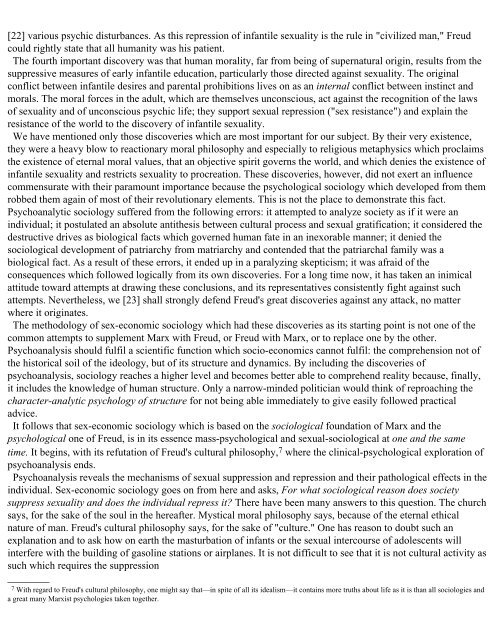The Mass Psychology of Fascism - Anxiety Depression Self-Help
The Mass Psychology of Fascism - Anxiety Depression Self-Help
The Mass Psychology of Fascism - Anxiety Depression Self-Help
Create successful ePaper yourself
Turn your PDF publications into a flip-book with our unique Google optimized e-Paper software.
[22] various psychic disturbances. As this repression <strong>of</strong> infantile sexuality is the rule in "civilized man," Freud<br />
could rightly state that all humanity was his patient.<br />
<strong>The</strong> fourth important discovery was that human morality, far from being <strong>of</strong> supernatural origin, results from the<br />
suppressive measures <strong>of</strong> early infantile education, particularly those directed against sexuality. <strong>The</strong> original<br />
conflict between infantile desires and parental prohibitions lives on as an internal conflict between instinct and<br />
morals. <strong>The</strong> moral forces in the adult, which are themselves unconscious, act against the recognition <strong>of</strong> the laws<br />
<strong>of</strong> sexuality and <strong>of</strong> unconscious psychic life; they support sexual repression ("sex resistance") and explain the<br />
resistance <strong>of</strong> the world to the discovery <strong>of</strong> infantile sexuality.<br />
We have mentioned only those discoveries which are most important for our subject. By their very existence,<br />
they were a heavy blow to reactionary moral philosophy and especially to religious metaphysics which proclaims<br />
the existence <strong>of</strong> eternal moral values, that an objective spirit governs the world, and which denies the existence <strong>of</strong><br />
infantile sexuality and restricts sexuality to procreation. <strong>The</strong>se discoveries, however, did not exert an influence<br />
commensurate with their paramount importance because the psychological sociology which developed from them<br />
robbed them again <strong>of</strong> most <strong>of</strong> their revolutionary elements. This is not the place to demonstrate this fact.<br />
Psychoanalytic sociology suffered from the following errors: it attempted to analyze society as if it were an<br />
individual; it postulated an absolute antithesis between cultural process and sexual gratification; it considered the<br />
destructive drives as biological facts which governed human fate in an inexorable manner; it denied the<br />
sociological development <strong>of</strong> patriarchy from matriarchy and contended that the patriarchal family was a<br />
biological fact. As a result <strong>of</strong> these errors, it ended up in a paralyzing skepticism; it was afraid <strong>of</strong> the<br />
consequences which followed logically from its own discoveries. For a long time now, it has taken an inimical<br />
attitude toward attempts at drawing these conclusions, and its representatives consistently fight against such<br />
attempts. Nevertheless, we [23] shall strongly defend Freud's great discoveries against any attack, no matter<br />
where it originates.<br />
<strong>The</strong> methodology <strong>of</strong> sex-economic sociology which had these discoveries as its starting point is not one <strong>of</strong> the<br />
common attempts to supplement Marx with Freud, or Freud with Marx, or to replace one by the other.<br />
Psychoanalysis should fulfil a scientific function which socio-economics cannot fulfil: the comprehension not <strong>of</strong><br />
the historical soil <strong>of</strong> the ideology, but <strong>of</strong> its structure and dynamics. By including the discoveries <strong>of</strong><br />
psychoanalysis, sociology reaches a higher level and becomes better able to comprehend reality because, finally,<br />
it includes the knowledge <strong>of</strong> human structure. Only a narrow-minded politician would think <strong>of</strong> reproaching the<br />
character-analytic psychology <strong>of</strong> structure for not being able immediately to give easily followed practical<br />
advice.<br />
It follows that sex-economic sociology which is based on the sociological foundation <strong>of</strong> Marx and the<br />
psychological one <strong>of</strong> Freud, is in its essence mass-psychological and sexual-sociological at one and the same<br />
time. It begins, with its refutation <strong>of</strong> Freud's cultural philosophy, 7 where the clinical-psychological exploration <strong>of</strong><br />
psychoanalysis ends.<br />
Psychoanalysis reveals the mechanisms <strong>of</strong> sexual suppression and repression and their pathological effects in the<br />
individual. Sex-economic sociology goes on from here and asks, For what sociological reason does society<br />
suppress sexuality and does the individual repress it? <strong>The</strong>re have been many answers to this question. <strong>The</strong> church<br />
says, for the sake <strong>of</strong> the soul in the hereafter. Mystical moral philosophy says, because <strong>of</strong> the eternal ethical<br />
nature <strong>of</strong> man. Freud's cultural philosophy says, for the sake <strong>of</strong> "culture." One has reason to doubt such an<br />
explanation and to ask how on earth the masturbation <strong>of</strong> infants or the sexual intercourse <strong>of</strong> adolescents will<br />
interfere with the building <strong>of</strong> gasoline stations or airplanes. It is not difficult to see that it is not cultural activity as<br />
such which requires the suppression<br />
________<br />
7 With regard to Freud's cultural philosophy, one might say that—in spite <strong>of</strong> all its idealism—it contains more truths about life as it is than all sociologies and<br />
a great many Marxist psychologies taken together.


